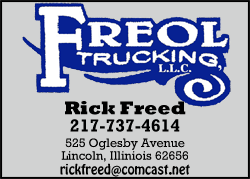 The discussions began with the topic of how to keep our young people
interested and invested in the community, but it also moved on to
how we are perceived as a community by outsiders. The discussions began with the topic of how to keep our young people
interested and invested in the community, but it also moved on to
how we are perceived as a community by outsiders.
In the course of that conversation, some interesting matters came
to light.
A guest in the audience commented that on the Internet, Lincoln
is "hard to find." He said that if you search Lincoln, Ill., you get
bits and pieces of different groups and organizations, but there is
not a central location that can really educate outsiders on the
city.
Dave Doolin, who works with several of the local organizations on
their website design, agreed. He said, though, that putting
everything in one location is a difficult process, but one he does
believe needs to be done.
It was brought up that when people come to town, there is very
little written information about the community. It was also
commented, though, that not many people look for brochures these
days, they look for apps.

Another comment made is that the people coming into town don't
know how to navigate through the city and find what is here. Christy
Alley commented on this further, saying that this year during the
balloon fest, she helped with the barbecue and was continually
helping people figure out how to get from one spot to another.
Alley also said she felt that the citizens of Lincoln were not
good ambassadors, that they did not do a good job of making visitors
feel welcome.
Alderwoman Kathy Horn spoke about when she moved to Lincoln 45
years ago and received a visit from the Welcome Wagon. She said she
felt newcomers would benefit from something similar, and noted again
that maybe it could even be a website that would provide information
about the town and the geography of where things are located.
Moving on, in the discussion of local amenities, it was suggested
that as an agricultural community, it would be good to get youth
organizations such as FFA involved in developing a better local
farmers market. A guest said that the markets available in Lincoln
were terrible and that it should not be that way in an agricultural
community.
It was also mentioned that in Logan County there are a lot of
great kids who do great things, but we don't acknowledge them well
enough, and we don't do anything to showcase their achievements and
celebrate them.
Another guest talked about their hometown of Olney and how the
community every year has a Christmas light show at the city
park/fairgrounds. He said it draws people to the community, and the
people of the community get involved in putting the displays
together.
Another guest spoke up and said that while all of this was good,
it was all going to take money, and where was that money going to
come from? In addition, he said ideas are good, but who is going to
take charge and implement them even if there was money? He said
there needed to be a determination of what the capital need is, and
where the money will come from.

Another guest said he moved his family home to Lincoln because he
wanted his son to go to Lincoln High School.
He commented on the NPR article: "I was infuriated when I read
the article, but the more I thought about it, I thought, ‘Hey, what
have I done besides come back to Lincoln?'"
He went on to say that he thought another big issue in the city
was community cleanliness. He added that when the community needs
capital, it will be available. He said you go to places like
Wal-Mart and tell them you need paint for a project, they will give
paint. He said politicians raise funds 24 hours a day and they get
what they need.
Doolin said some might be surprised to know that the money is out
there. He noted that he has had people come to him ready to write
the check to help with a project. He noted they are the ones who
don't want to or can't do the work, but they are willing to finance
it.
He also touched on another important topic, saying that what our
youth feel about the community may be a reflection of what adults
feel. He said that if we are unhappy and complaining, our kids will
adopt that same attitude.
He also noted that around the community, people are tired of
talk. They want to see progress.

[to top of second column] |

Patrick Doolin drove that home a little further, saying that was
part of the purpose of the round table. He said he wanted people to
be prepared to act on their ideas. He said everyone can have passion
for a project, but if they sit and don't take action, it is all just
talk.
Seth Goodman also spoke up and added more to the conversation,
saying that it does begin at home. He noted that as a kid growing up
in Lincoln, his parents found things for him to do that made life in
this community good.
At the end of the evening, Doolin asked Lindvahl to make a few
comments on what the group should do next. Earlier in the evening,
Lindvahl had commented that he was happy to see the attitude of the
group and defined it as positive. He noted that he has attended
several similar meetings and it would literally wear him out to hear
the negativity in the room. However, here he was seeing something
completely different.
He told the group that they should always know what they would do
with $1 million if someone handed it to them. He explained that he
wanted them to always be thinking of what was needed and how to
achieve it. Then when the financial opportunity arises, they will
know which way to go to get the money and make it work for their
city.
He told the group to take charge of the things they can get
behind. He said that if one is interested in creating a dog park,
then take charge and go do it.
He said that the people in the room, with their different
interests, should consider themselves as spokes in the wheel. He
said every wheel needs a hub, and maybe the hub was already in place
through the round table. But the individual ideas and their
implementers are the spokes in the wheel, and the hub needs to be a
single entity that has an understanding of what all the spokes are
doing.

He also commented on the McEvers story, telling the group that
she had really done no harm to the community. He said no one was
going to read that story and decide they didn't want to move to
Lincoln. He also noted that in the chat line attached to the story,
the city of Lincoln was hardly mentioned. The chat moved on to
people hating the rich. Regardless, he said the story will die and
will be gone.
But he added that if it was this story that served to galvanize
people and get them fired up for their community, then that was a
good thing.
He also told them to work on their idea and not to overburden
themselves with the thoughts of what could go wrong or fail. He
said, "If you list all the things that could go wrong, you will not
move forward."
As Doolin brought the meeting to a close, he told the group there
were tables at the back of the room with large pieces of paper on
them. During the course of the evening, Blinn Bates had been making
a list of key suggestions for change and improvement.
In total there were eight ideas. Doolin told the audience to pick
one of the eight, go to a table as a group, and start making notes
on what to do and how to do it.
Afterward, several did go to tables. They gathered around and
listed specific things that needed to be done under a certain
heading.
As some folks talked about these, others wandered from table to
table and looked at the various lists. In some cases there were
projects on the list that are already underway, such as downtown
beautification. What this brought to light was that there are still
those in the city who don't know that there is a Plant the Town Red
project and a downtown revitalization project.

Other ideas were new. The creation of a community center, not
just for kids but for families, was one such idea.
After everyone was finished, the pages of paper were collected.
The round-table group will continue working on this through
future meetings. Doolin said he was calling the next meeting
tentatively to be on Dec. 11. At that time he hopes to hear from
people that they have taken steps toward achieving something on
their list, and that they will share what they have accomplished and
how.
[By NILA SMITH]
Part 1, posted Friday, Nov. 15
Past related article
|